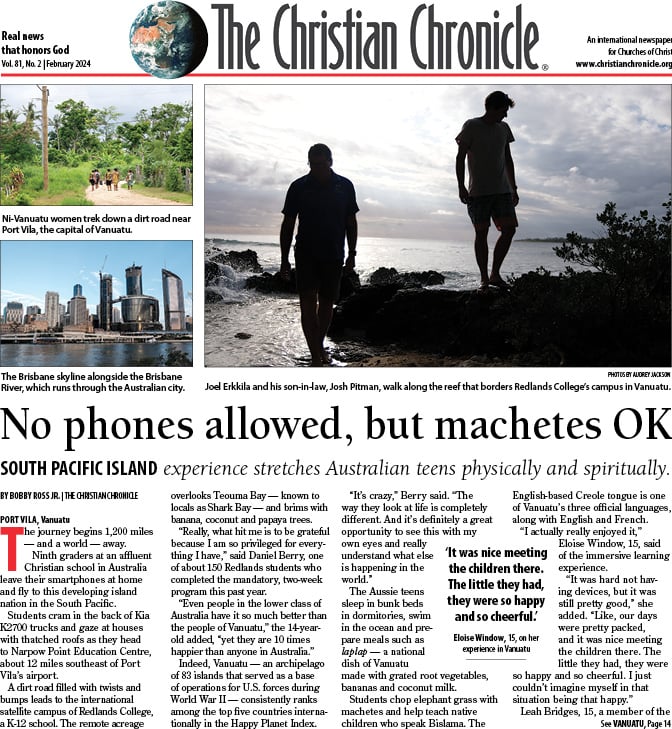PBS program claims Bible is historically unreliable
An upcoming “NOVA” documentary entitled “The Bible’s Buried Secrets,” to be broadcast Nov. 18 on PBS, will challenge the integrity of the Bible and infuriate most Christians.
According to an early report, the existence of Abraham, the lack of evidence for the Exodus claim that the Israelites believed that God had a wife and the assertion that the Israelites were actually Canaanites are a few of the issues raised by the program.
Paula Aspell, “NOVA’s” senior executive producer, describes the broadcast “as a comprehensive archaeological and literary investigation” that will feature “in-depth discussions with leading biblical scholars and archaeologists.”
While many will be taken aback by the challenge, opposition to the Bible — even under the guise of “science” — is nothing new.
What is somewhat new is the presentation of these ideas in such a prestigious program.
As a professor of archaeology and biblical studies, I would like to offer some direction to viewers who are unfamiliar with these issues and counter, at least in part, the claim that the Bible is historically unreliable.
The problem with “The Bible’s Buried Secrets” is that with its apparent emphasis on archaeology, its conclusions are presented as science. Archaeology is not an exact science. While scientific methodologies are used in survey and excavation, the data must be interpreted, from the pottery and soil layers to the synthesis of massive amounts of information.
Interpretation in archaeology opens the door for an interpreter’s attitude toward the Bible to influence conclusions. What sometimes masquerades as “science” in biblical studies may be a reflection of an interpreter’s own worldview and assumptions.
An earlier generation of archaeologists believed that archaeology proves the Bible to be true. Today, a majority of archaeologists working in Palestine believes that archaeology proves that the Bible is historically unreliable. This change corresponds with a major archaeological discovery of the 20th century — the ambiguity in the archaeological record. How does one know, for example, if a Late Bronze Age destruction layer was the result of Israelite conquest or some other cause?
Because of the ambiguity in the archaeological record, proving the Bible is not a legitimate enterprise. This is reinforced by the more general character of most archaeological finds, the soil layers, walls, etc., in contrast with the biblical record of specific people and events. Archaeological discoveries rarely relate directly to Bible events. If the subjective nature of the archaeological data means that one cannot prove the Bible (as many scholars espouse), however, the view promoted in the PBS program that archaeology “scientifically” disproves the Bible is unfounded.
Fundamental to the “scientific” picture of Israel presented in the PBS program is the view that Israelite identity and religion evolved over time. In contrast with the biblical account of God revealing himself to the descendants of Abraham, Israelite self-understanding and a belief in one God developed from a polytheistic world view into the religion that is reflected in the Old Testament. Most recently, this has been articulated in the argument that the Israelites were originally Canaanites, a pastoral-nomadic population and/or those on the periphery of Canaanite society who settled in the hill country of Palestine and over time become Israelites.
More than 300 small settlements that suddenly appear in the hill country during the period archaeologists refer to as Iron I (1200-1000 B.C.) represent this Canaanite population, or early Israel. While the remains from the hill country settlements are no different from Canaanite material culture elsewhere, there is one important difference. In the hill country settlements, there are no pig bones.
The almost complete absence of pig bones in the Iron I hill country settlements conjures up the food restrictions of the Mosaic Covenant (Lev. 11:1-47; Deut. 14:3-20) and indicates that these settlements represent early Israel. In contrast with the “scientific” view that the Israelites were originally Canaanites, the archaeological record corresponds with the biblical story. Early Israel kept covenant with Yahweh and observed the food restrictions of the Law of Moses — food restrictions that were designed to keep them distinct from the Canaanites!
While legitimate issues exist, the viewer of “The Bible’s Buried Secrets,” recognizing the limitations of archaeology, can be confident that there is more to the discussion than appears in the program and have confidence in the biblical story of Yahweh working in Israel’s history.
JESSE C. LONG JR. is co-director of the archaeological expedition to Khirbet Iskander, Jordan. He is dean of the College of Biblical Studies and Behavioral Sciences at Lubbock Christian University in Texas.
According to an early report, the existence of Abraham, the lack of evidence for the Exodus claim that the Israelites believed that God had a wife and the assertion that the Israelites were actually Canaanites are a few of the issues raised by the program.
Paula Aspell, “NOVA’s” senior executive producer, describes the broadcast “as a comprehensive archaeological and literary investigation” that will feature “in-depth discussions with leading biblical scholars and archaeologists.”
While many will be taken aback by the challenge, opposition to the Bible — even under the guise of “science” — is nothing new.
What is somewhat new is the presentation of these ideas in such a prestigious program.
As a professor of archaeology and biblical studies, I would like to offer some direction to viewers who are unfamiliar with these issues and counter, at least in part, the claim that the Bible is historically unreliable.
The problem with “The Bible’s Buried Secrets” is that with its apparent emphasis on archaeology, its conclusions are presented as science. Archaeology is not an exact science. While scientific methodologies are used in survey and excavation, the data must be interpreted, from the pottery and soil layers to the synthesis of massive amounts of information.
Interpretation in archaeology opens the door for an interpreter’s attitude toward the Bible to influence conclusions. What sometimes masquerades as “science” in biblical studies may be a reflection of an interpreter’s own worldview and assumptions.
An earlier generation of archaeologists believed that archaeology proves the Bible to be true. Today, a majority of archaeologists working in Palestine believes that archaeology proves that the Bible is historically unreliable. This change corresponds with a major archaeological discovery of the 20th century — the ambiguity in the archaeological record. How does one know, for example, if a Late Bronze Age destruction layer was the result of Israelite conquest or some other cause?
Because of the ambiguity in the archaeological record, proving the Bible is not a legitimate enterprise. This is reinforced by the more general character of most archaeological finds, the soil layers, walls, etc., in contrast with the biblical record of specific people and events. Archaeological discoveries rarely relate directly to Bible events. If the subjective nature of the archaeological data means that one cannot prove the Bible (as many scholars espouse), however, the view promoted in the PBS program that archaeology “scientifically” disproves the Bible is unfounded.
Fundamental to the “scientific” picture of Israel presented in the PBS program is the view that Israelite identity and religion evolved over time. In contrast with the biblical account of God revealing himself to the descendants of Abraham, Israelite self-understanding and a belief in one God developed from a polytheistic world view into the religion that is reflected in the Old Testament. Most recently, this has been articulated in the argument that the Israelites were originally Canaanites, a pastoral-nomadic population and/or those on the periphery of Canaanite society who settled in the hill country of Palestine and over time become Israelites.
More than 300 small settlements that suddenly appear in the hill country during the period archaeologists refer to as Iron I (1200-1000 B.C.) represent this Canaanite population, or early Israel. While the remains from the hill country settlements are no different from Canaanite material culture elsewhere, there is one important difference. In the hill country settlements, there are no pig bones.
The almost complete absence of pig bones in the Iron I hill country settlements conjures up the food restrictions of the Mosaic Covenant (Lev. 11:1-47; Deut. 14:3-20) and indicates that these settlements represent early Israel. In contrast with the “scientific” view that the Israelites were originally Canaanites, the archaeological record corresponds with the biblical story. Early Israel kept covenant with Yahweh and observed the food restrictions of the Law of Moses — food restrictions that were designed to keep them distinct from the Canaanites!
While legitimate issues exist, the viewer of “The Bible’s Buried Secrets,” recognizing the limitations of archaeology, can be confident that there is more to the discussion than appears in the program and have confidence in the biblical story of Yahweh working in Israel’s history.
JESSE C. LONG JR. is co-director of the archaeological expedition to Khirbet Iskander, Jordan. He is dean of the College of Biblical Studies and Behavioral Sciences at Lubbock Christian University in Texas.

